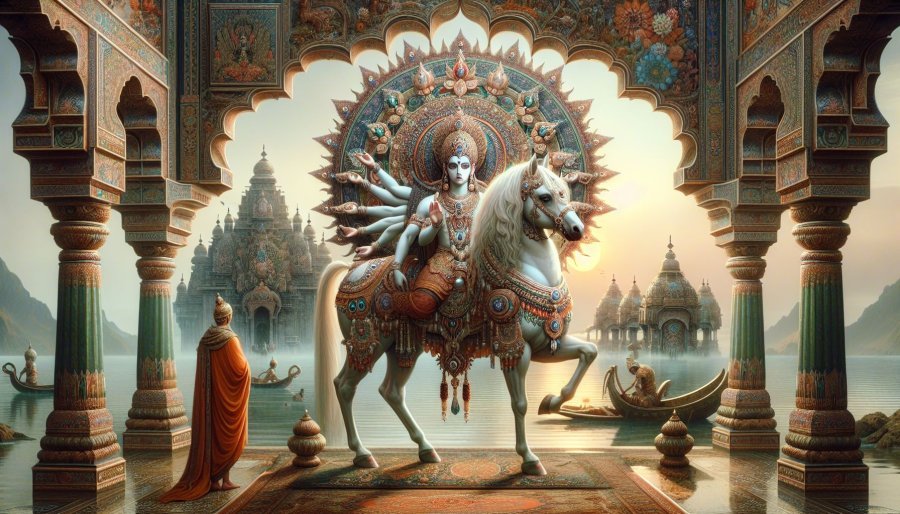Section XVII - Meru Mountain: The Churning of the Ocean for Nectar
Book index: Mahabharata (English)
This page contains a summary of the Mahabharata Section XVII including examples of moral lessons in daily life. The Maha-Bharata is one of the largest epics ever written containing roughly 100,000 Sanskrit verses. It deals with the legendary history of ancient India and contains a large number of interwoven tales.

Short summary of the chapter:
The story begins with the two sisters seeing the divine steed named Uccaihsravas, which was worshipped by the gods and emerged during the churning of the Ocean for nectar. The steed was described as graceful, perpetually young, and possessing irresistible vigour. Saunaka inquires about the reason behind the gods' churning of the Ocean for nectar and the circumstances surrounding the appearance of Uccaihsravas. Sauti explains that the gods gathered on the mountain named Meru, known for its beauty and divine attributes, to discuss obtaining amrita (celestial ambrosia) through churning the Ocean.
The celestial beings, including Nara-yana and Brahman, decided to churn the Ocean with the gods and the Asuras to obtain amrita, along with other valuable treasures. Nara-yana advised the gods to undertake this task in order to discover the nectar of immortality. The celestial assembly was filled with anticipation and eagerness to obtain amrita by churning the Ocean. The gods, Asuras, and other divine beings prepared to embark on the challenging and auspicious task of churning the Ocean for the ultimate reward of amrita.
Full English translation:
This page is merely a summary which is automatically generated. If you are looking for authentic sources such as the Sanskrit text or the Full English translation of Mahabharata Section XVII - Meru Mountain: The Churning of the Ocean for Nectar, have a look at the following articles:
Section XVII, online text
English translation by Kisari Mohan Ganguli.
Read this and other chapters online.
Mahabharata (English Summary)
by Kisari Mohan Ganguli | ISBN-10: 8121505933
Buy the latest edition:
FAQ of Mahabharata, Section XVII:
Why did the gods churn the Ocean for nectar?
The celestial assembly, eager for amrita, was advised by Nara-yana to churn the Ocean to obtain amrita, along with drugs and gems. The gods were instructed to perform this task.
When did the powerful steed Uccaihsravas arise?
Uccaihsravas, the gem of steeds, sprang up during the churning of the Ocean for nectar. It was worshipped by the gods, possessed divine grace and vigour, and was considered a masterpiece of creation.
Daily life: Meru Mountain: The Churning of the Ocean for Nectar:
The story from the Astika Parva illustrates the search for amrita, or celestial ambrosia, by the gods, leading them to churn the Ocean under divine guidance. This ancient tale can inspire us in our daily lives to pursue our goals with determination and collaboration. Just like the gods and the Asuras came together despite their differences, we too can work alongside others, even those with varying viewpoints, to achieve common objectives. Hard work and perseverance, as demonstrated by the act of churning the ocean, are crucial components of success. Seeking guidance from those wiser, akin to the gods consulting Narayana and Brahman, is also beneficial. Additionally, the story underscores the belief in the existence of valuable outcomes (amrita, drugs, and gems) as a result of collective effort and dedication. Thus, it teaches us the importance of teamwork, persistence, and guidance in overcoming challenges and accomplishing greatness.
